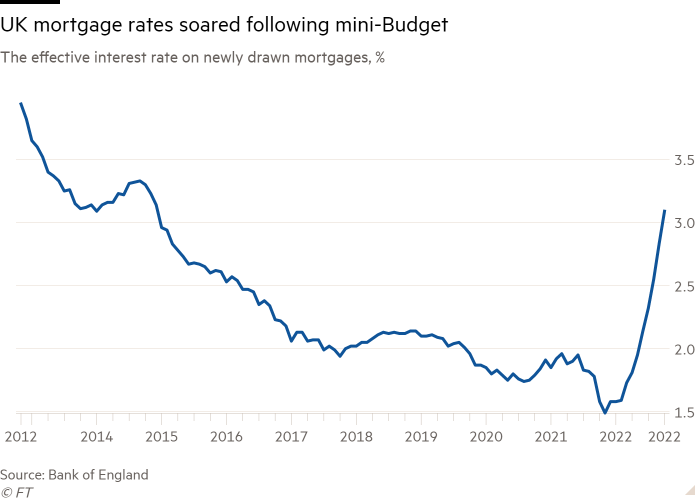UK mortgage approvals have dropped to their lowest level since the stringent lockdown of June 2020 as borrowing rates soared to an eight-year high.
Approvals for house purchases fell more than expected to 59,000 in October, compared with 66,000 in September, and came below the previous six-month average of 66,000, the Bank of England said on Tuesday.
Economists polled by Reuters had forecast 60,200. Mortgage approvals were at their lowest level since spring 2020, the central bank said.
Its data showed the “effective” interest rate — the actual interest rate paid — on newly drawn mortgages had increased by 25 basis points to 3.09 per cent in October, the highest since 2014.
Samuel Tombs, chief UK economist at the consultancy Pantheon Macroeconomics, said the rise was based on completed housing transactions, relating to mortgages agreed with lenders a few months ago and not incorporating the full extent of the recent increase in offered mortgage rates.
He said the average mortgage rate would probably soar to 6 per cent at the start of 2023 and that mortgage approvals would continue to fall as the squeeze on real incomes intensified. He forecast that UK house prices would, as a result, fall by 8 per cent in the next 12 months.

Ashley Webb, UK economist at the consultancy Capital Economics, agreed. “Given we still think mortgage rates will average 5 per cent in 2023, we expect a 12 per cent peak-to-trough fall in house prices,” he said.
Tom Bill, head of UK residential research at estate agent Knight Frank, said he expected house prices to drop by about 10 per cent over the next two years “as a new lending landscape emerges after 13 years of ultra-low rates”.
The property market is already showing many signs of weaknesses, with the average UK house price flatlining in September for the first time in almost a year. Newer data from the mortgage provider Halifax showed house prices falling between September and October, the first drop since July 2021.
BoE data also showed that net borrowing of mortgage debt by individuals declined month on month from £5.9bn to £4bn, the lowest level since November 2021 and well below analysts’ forecasts.
Mortgage rates, by contrast, are on the rise, pegging interest rate increases as the UK faces record-high inflation. The rise in borrowing costs was exacerbated by the market turmoil sparked by Liz Truss’s ill-fated “mini” Budget on September 23.

“Average mortgage rates surged during October amid the chaotic days following the “mini” Budget,” said Simon Gammon, managing partner at Knight Frank Finance.
“It wasn’t until very recently that lenders began dropping rates following the BoE’s intervention and subsequent scrapping of the government’s most controversial proposals,” he added.
However, markets expect the BoE’s Monetary Policy Committee to raise the base rate, now at 3 per cent, by another 50 basis points when it meets in December, and to continue increasing it to 4.6 per cent next spring.
With high inflation and further rate rises set to add to the squeeze on household finances, Webb predicted that “housing market activity will fall sharply from here and real GDP will decline by 2 per cent during a recession”.